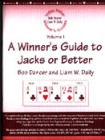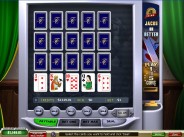
Winner's Guide Volume 1: 2nd Edition - Jacks or Better
Bob Dancer and Liam W. Daily have just released the second edition of Winner's Guide Volume 1 -- Jacks or Better. This new edition has been expanded to 128 pages and features the following enhancements: 1) A complete discussion of the differences between Jacks or Better and other popular games, including Double Bonus, Double Double Bonus and Deuces Wild. 2) Enhanced (more user-friendly) notations --- done in conjunction with the latest Dancer/Daily Strategy Cards. 3) An updated strategy for Level 4 Flush-5
With these improvements, Winner's Guide Volume 1 presents the most comprehensive discussion of Jacks or Better ever published.
Different Jacks or Better Pay Tables Require Different Strategies
 Bob Dancer is one of the world's foremost video poker experts. He is a regular columnist for Casino Player, Strictly Slots, and the Las Vegas Review-Journa land has written an autobiography and a novel about gambling. He provides advice for tens of thousands of casino enthusiasts looking to play video poker. Bob's website is www.bobdancer.com not identical. Let's see why.
Bob Dancer is one of the world's foremost video poker experts. He is a regular columnist for Casino Player, Strictly Slots, and the Las Vegas Review-Journa land has written an autobiography and a novel about gambling. He provides advice for tens of thousands of casino enthusiasts looking to play video poker. Bob's website is www.bobdancer.com not identical. Let's see why.
Let's take the hand Ah Qh Ks Js 9s as an example, and assume we are playing for dollars. The relevant choices are AKQJ and KJ9. There are some other possibilities, but they are worth quite a bit less.
In 9/6 Jacks, AKQJ is worth $2.98 on average. How much do you think its value will change when you go to the 8/5 game? It won't change at all. The only good things that can happen when you draw one card to AKQJ are either a straight or a high pair. And neither of those hands change values between the two games. So if it's worth $2.98 in one of the games, it is worth $2.98 in the other.
In 9/6 Jacks, a suited KJ9 is worth $3.11 in this hand, so naturally it is the preferred play over the $2.98 AKQJ. When we draw to a suited KJ9 we are trying to get a straight flush, but we will end up with a regular flush about 4% of the time. The lower value of the flush is worth about 20¢ in value, so in 8/5, a suited KJ9 combination is worth only $2.91. Therefore, in the 8/5 game, AKQJ is the better play.
Another type of combination that changes are 2-card royals. These combinations are worth about 5.5¢ less in the 8/5 game --- but this 5.5¢ consists of a loss of 5¢ due the lower value of the flush and 0.5¢ due to the lower value of the full house. When you have two unsuited high cards, their value will only change by 0.5¢ because the return on a flush is irrelevant when the cards are unsuited.
There are a lot of combinations with a suited highcard-ten combination and a high card of another suit. Combinations like As Qh Th, where the choice is between AQ and QT. Some of these are close plays, and when you switch from 9/6 to 8/5, the highcard-ten combinations are reduced in value by about 5¢ more than the two unsuited highcard combination. Many of the correct plays change. If you play at a very-approximate level, the strategies for the two games are identical. But if you learn every last play, there are a number of differences.
A case can be made that nobody will play both games. If you can find both games, you'll certainly play the 9/6 version as it returns over $70 per hour more than the 8/5 version. And anybody smart enough to learn 9/6 Jacks will be smart enough to NEVER play 8/5 Jacks. Probably true.
However, the strategy for 8/5 Jacks is identical (with rare and minor exceptions) whether quads pay 25 or 35. The 8/5/35 game, found at the Palms among other places, returns 99.66% and is called "Bonus Poker" by IGT. To me, this is a Jacks or Better game, as the "essence" of Jacks or Better is two pair pays 2 and all quads pay the same amount, and the "essence" of Bonus Poker is two pair pays 2 and quads pay 25, 40 or 80 depending on which ones they are.
But whatever the name, if a smart player had the choice between 9/6 Jacks and the 8/5/35 game, the 8/5/35 should be the choice. But to do well, this player would need to know the differences between them. Although similar, these are not the same games. In the upcoming weeks, we'll discuss several differences between them.

